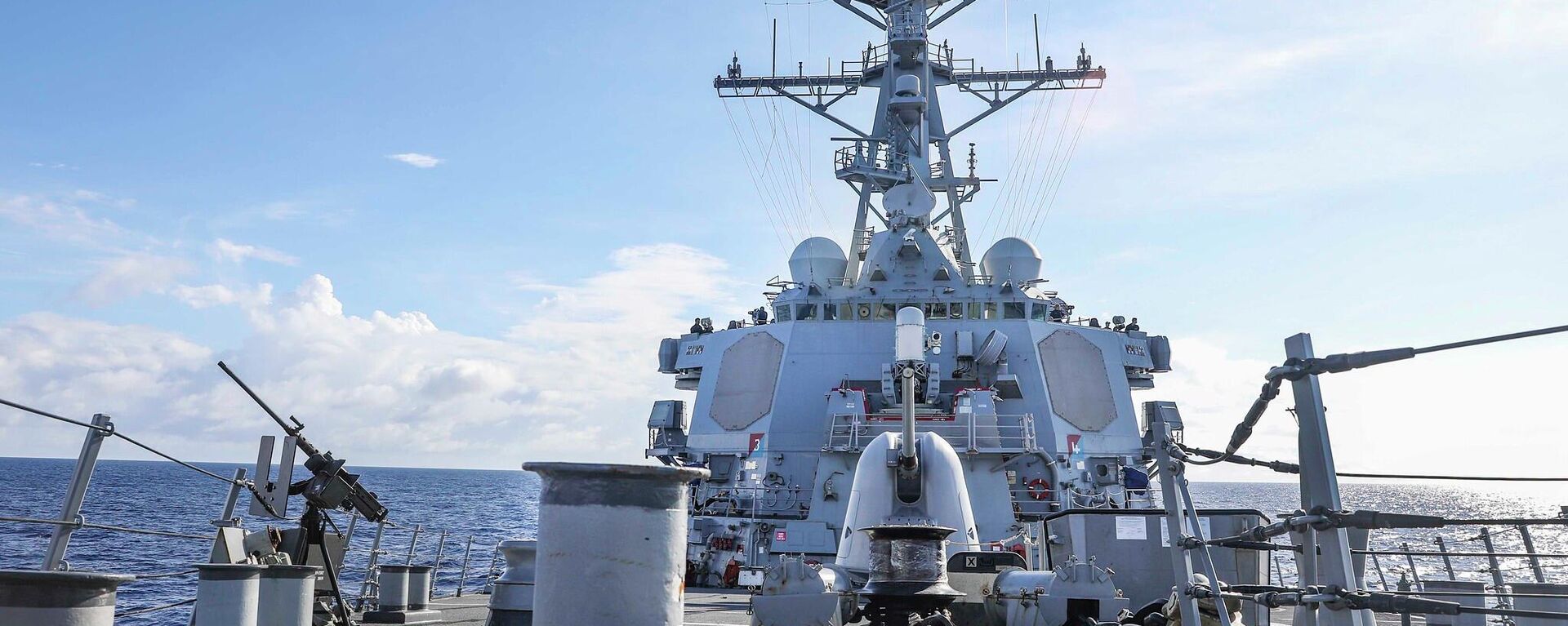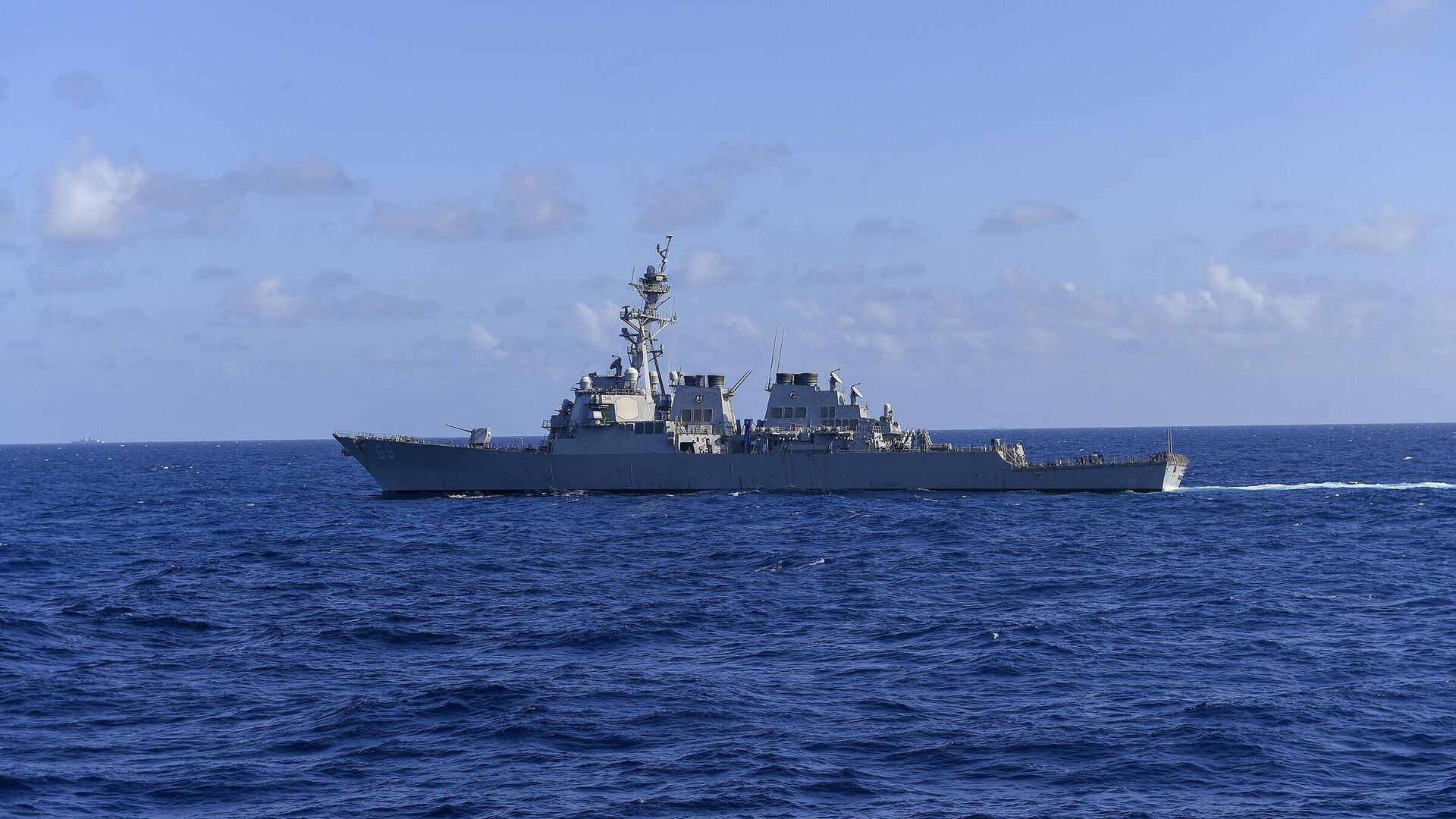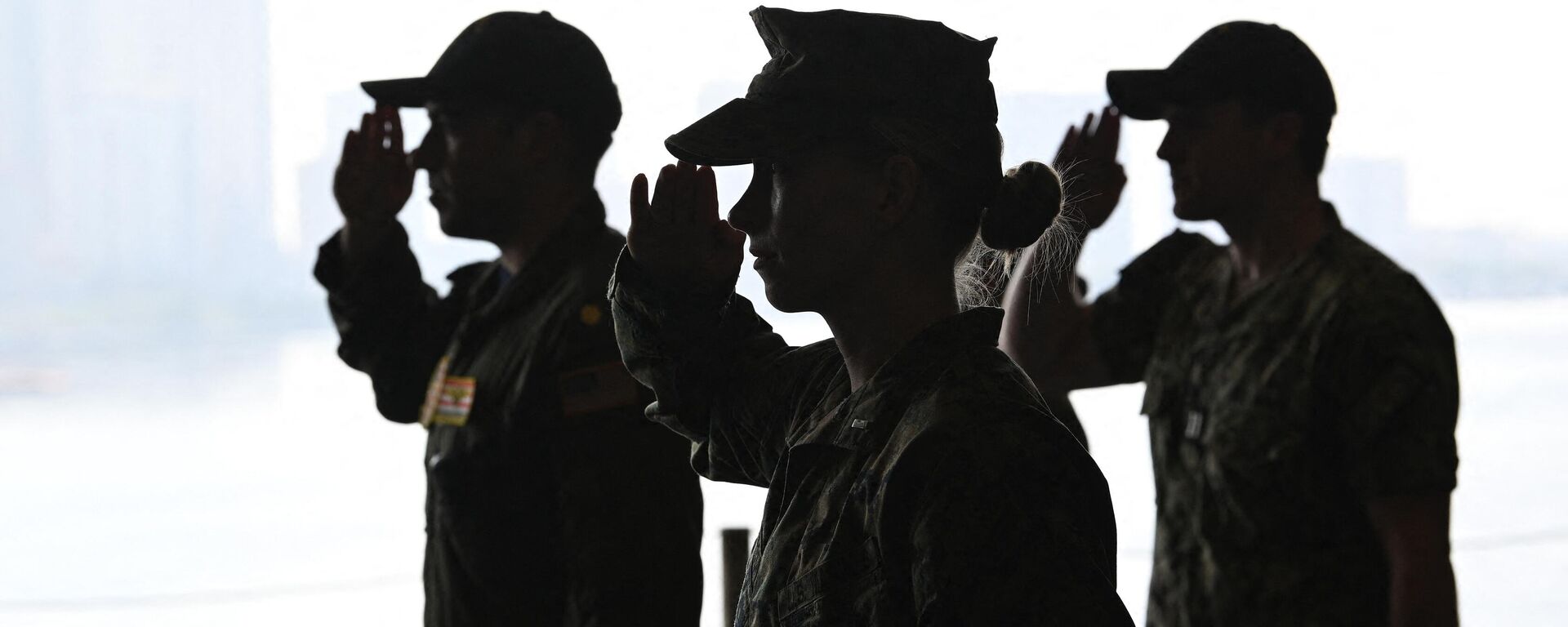https://sputnikglobe.com/20230323/us-navy-claims-warship-was-not-expelled-by-pla-from-waters-near-chinese-islands-1108730508.html
US Navy Claims Warship 'Was Not Expelled' by PLA From Waters Near Chinese Islands
US Navy Claims Warship 'Was Not Expelled' by PLA From Waters Near Chinese Islands
Sputnik International
Claiming it is opposing Chinese "expansionist" plans, the US routinely flouts Chinese claims of sovereignty wherever they are in dispute, dubbing the incidents... 23.03.2023, Sputnik International
2023-03-23T16:50+0000
2023-03-23T16:50+0000
2023-03-23T16:50+0000
world
south china sea
us navy
paracel islands
china
freedom of navigation operations (fonops)
https://cdn1.img.sputnikglobe.com/img/07e7/03/17/1108730298_0:142:2400:1492_1920x0_80_0_0_ef8981a064704644b47964b3bec5ddff.jpg
The Chinese military said on Thursday it had "expelled" a US warship from Chinese waters in the South China Sea."The naval and aerial forces of the Chinese PLA Southern Theater Command conducted whole-process tracking and monitoring on the US destroyer in accordance with the law, and warned it off," the statement continued, adding that the US move had "seriously jeopardized the peace and stability" of the region."The troops of the PLA Southern Theater Command will always stay on high alert and take all necessary measures to resolutely safeguard China's national sovereignty and security, as well as peace and stability in the South China Sea," the spokesperson stressed.In response, the US Navy gave its standard denial when accused of such violations.The US statement raises the inevitable question of what exactly constitutes an "expulsion." Typically such violations include a series of verbal warnings that in the past have escalated into close encounters in the air or on the sea. In one 2018 incident near the Nansha Islands (Spratly in English), the Chinese destroyer Lanzhou came within just 45 yards of the American destroyer USS Decatur, forcing the US warship to "slam on the brakes" to avoid a collision.Washington's 'Zero-Sum Mentality'China’s claims over the two sets of islands overlap with claims by several other nations, including Vietnam, the Philippines, Malaysia, and Brunei. Taiwan, a self-governing Chinese province that enjoys US support, also controls islands in the waterway. For years, efforts by Beijing and the Association of Southeast Asian Nations (ASEAN) have inched forward on a Code of Conduct for the South China Sea that would establish impartial "rules of the road" for settling such disputes as well as encounters at sea, but the US has opposed those efforts for fear the end result won’t be anti-China enough.Earlier this year, the US said it would seek to open four new military bases in the Philippines, a former US colony with which it maintains a mutual defense treaty. The bases will be ideally situated for further policing of the South China Sea and will provide further staging grounds for US forces in the event of a conflict with China.China has sharply protested the move, as have left-wing groups in the Philippines, and China’s vice-minister of Foreign Affairs, Sun Widong, left for Manila on Thursday. He is slated to meet with his counterpart, Philippine Foreign Minister Theresa Lazaro, to “have in-depth communication on properly handling maritime disputes and advancing practical maritime cooperation, and exchange views on international and regional issues of shared interest,” according to the Chinese ministry."It is China’s consistent belief that defense and security cooperation between countries needs to be conducive to regional peace and stability and not targeted at or harmful to the interests of any third party. The US side, out of selfish interests, remains trapped in a zero-sum mentality and keeps increasing military deployment in the Asia-Pacific. This would escalate tensions and endanger peace and stability in the region. Regional countries need to remain vigilant and avoid being coerced or used by the US," he added.
https://sputnikglobe.com/20230119/philippine-president-south-china-sea-dispute-has-potential-to-be-disastrous-for-entire-world-1106505346.html
https://sputnikglobe.com/20230323/china-wants-closer-strategic-ties-with-philippines-amid-manila-washington-collaboration-1108714394.html
south china sea
paracel islands
china
Sputnik International
feedback@sputniknews.com
+74956456601
MIA „Rossiya Segodnya“
2023
News
en_EN
Sputnik International
feedback@sputniknews.com
+74956456601
MIA „Rossiya Segodnya“
Sputnik International
feedback@sputniknews.com
+74956456601
MIA „Rossiya Segodnya“
south china sea, us navy, paracel islands, china, freedom of navigation operations (fonops)
south china sea, us navy, paracel islands, china, freedom of navigation operations (fonops)
US Navy Claims Warship 'Was Not Expelled' by PLA From Waters Near Chinese Islands
Claiming it is opposing Chinese "expansionist" plans, the US routinely flouts Chinese claims of sovereignty wherever they are in dispute, dubbing the incidents "freedom of navigation operations." However, the United Nations convention it claims to be enforcing is not a treaty the US has ever submitted itself to.
The Chinese military
said on Thursday it had "expelled" a US warship from Chinese waters in the South China Sea.
"On March 23, the US guided-missile destroyer USS Milius illegally entered the territorial waters near China's Xisha Islands without [the] Chinese government's permission,” a spokesperson for the People’s Liberation Army’s regional command said in a statement. Xisha is the name used by Beijing for the island chain south of Hainan that is known in Vietnam as the Hoang Sa Archipelago and in English as the Paracel Islands.
"The naval and aerial forces of the Chinese PLA Southern Theater Command conducted whole-process tracking and monitoring on the US destroyer in accordance with the law, and warned it off," the statement continued, adding that the US move had "seriously jeopardized the peace and stability" of the region.

19 January 2023, 21:04 GMT
"The troops of the PLA Southern Theater Command will always stay on high alert and take all necessary measures to resolutely safeguard China's national sovereignty and security, as well as peace and stability in the South China Sea," the spokesperson stressed.
In response, the US Navy gave its standard denial when accused of such violations.
"USS Milius is conducting routine operations in the South China Sea and was not expelled," a spokesperson for the US 7th Fleet told reporters. "The United States will continue to fly, sail and operate wherever international law allows."
The US statement raises the inevitable question of what exactly constitutes an "expulsion." Typically such violations include a series of verbal warnings that in the past have escalated into close encounters in the air or on the sea. In
one 2018 incident near the Nansha Islands (Spratly in English), the Chinese destroyer Lanzhou came within just 45 yards of the American destroyer USS Decatur, forcing the US warship to "slam on the brakes" to avoid a collision.
Washington's 'Zero-Sum Mentality'
China’s claims over the two sets of islands
overlap with claims by several other nations, including Vietnam, the Philippines, Malaysia, and Brunei. Taiwan, a self-governing Chinese province that enjoys US support, also controls islands in the waterway. For years, efforts by Beijing and the Association of Southeast Asian Nations (ASEAN)
have inched forward on a Code of Conduct for the South China Sea that would establish impartial "rules of the road" for settling such disputes as well as encounters at sea, but the US has opposed those efforts for fear the end result won’t be anti-China enough.
Since 2018, the US has oriented its foreign policy strategy around the idea that China and Russia are threats to the US-led global order, which Washington terms the "rules-based international order." It claims such " "FONOPS" are enforcing those rules, but the rules in question in the South China Sea dispute - the United Nations Convention on the Law of the Sea - are from a document the US has officially refused to sign.
Earlier this year, the US said it would seek to open four new military bases in the Philippines, a former US colony with which it maintains a mutual defense treaty. The bases will be ideally situated for further
policing of the South China Sea and will provide
further staging grounds for US forces in the event of a conflict with China.
China has sharply protested the move,
as have left-wing groups in the Philippines, and China’s vice-minister of Foreign Affairs, Sun Widong, left for Manila on Thursday. He is slated to meet with his counterpart, Philippine Foreign Minister Theresa Lazaro, to “have in-depth communication on properly handling maritime disputes and advancing practical maritime cooperation, and exchange views on international and regional issues of shared interest,” according to the Chinese ministry.
"China and the Philippines are close neighbors. We hope and believe that this round of consultation will help enhance mutual understanding and trust and bring about closer communication and coordination between the two sides, and galvanize joint efforts for the sound and steady growth of bilateral ties," a ministry spokesperson told reporters on Thursday.
"It is China’s consistent belief that defense and security cooperation between countries needs to be conducive to regional peace and stability and not targeted at or harmful to the interests of any third party. The US side, out of selfish interests, remains trapped in a zero-sum mentality and keeps increasing military deployment in the Asia-Pacific. This would escalate tensions and endanger peace and stability in the region. Regional countries need to remain vigilant and avoid being coerced or used by the US," he added.




